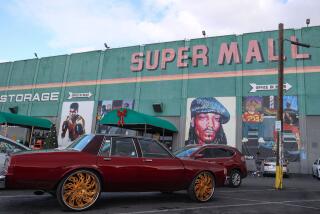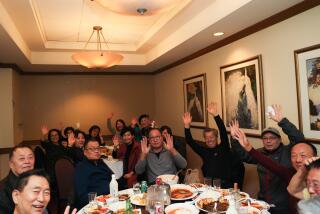Purge of Kim Jong Un’s uncle unsettles North Korean businesspeople
YANJI, China — She was a North Korean success story.
For more than two decades, the woman, now 50, dabbled in various businesses at the border between China and North Korea. She sold rice. She traded foreign currency. She opened a massage parlor in China. She traveled between the two countries with relative ease and was making sufficient money to live comfortably, so much so that she rebuffed invitations to join her sister, who had defected to South Korea.
But the woman, who didn’t want her name used out of fear for her safety, has changed her thinking about the future since the December execution of Jang Song Taek, the uncle by marriage of North Korean leader Kim Jong Un. Jang, 67, was long viewed as a champion of free enterprise within the nominally communist state, and his purge has rattled many North Koreans.
“People are scared. If he could do this to his own uncle, what would he do to the rest of us?” said the woman in an interview in a hotel room in Yanji, a city 20 miles from the North Korean border where she has been living in recent years.
The woman, wearing heavy makeup and a fake-fur-trimmed sweater and rhinestones, trying hard not to look North Korean for fear of being deported, , confided in a tremulous voice her plan to escape to South Korea.
The sentiment reverberates throughout the community of expatriate North Koreans here. Until recently, it was assumed that Kim, 31, would steer the country toward economic reforms. In Pyongyang, the North Korean capital, there are new restaurants, a pizzeria and a coffee shop; the country in November announced 13 special economic zones designed to encourage free trade, similar to those that pried China open in the 1980s. There was more tolerance for entrepreneurs working the border and selling at the jamadang, North Korea’s open-air markets.
“We had been hopeful. We thought things were getting better,” said the woman, who comes from Undok, a town in the far north that was part of a special economic zone.
Thousands of North Koreans live and work without legal standing across the border in northeastern China. About 1,500 North Koreans defected last year to South Korea, according to government figures from Seoul, most of them initially crossing the 850-mile-long China-North Korea border. The numbers had trailed off recently, in part because the moribund North Korean economy looked as though it was coming to life, but they are expected to pick up this year because of the reverberations of Jang’s execution.
“It might be the largest wave of defections ever, not in numbers but in political significance,” said Andrei Lankov, a North Korea expert at Seoul’s Kookmin University. “I would expect to see officers, people handling foreign trade, private operators and their families.”
South Korean news media have been replete with reports of high-ranking defectors, among them Jang’s minions in business and government. But it is clear from interviews near the border that low-level businesspeople, who never came close to meeting Jang, are among those shaken.
Another North Korean woman living in Yanji, who is married to a Chinese man, said she had a sister who was considering defecting because of the Jang killing.
“We were very shocked. Jang was a very famous person. Even children knew his name. He was going to do economic reforms,” said Li Saera, 43, originally from Hoeryong, a border town.
Even with North Korea’s abysmal human rights reputation, the purge was shocking for its ruthlessness. Once the second-most powerful man in the country, Jang was shown on state television being yanked by his armpits out of his seat at a conclave of the ruling Workers’ Party. State media denounced him as “despicable human scum … worse than a dog” and reported that he had been swiftly executed.
An unsubstantiated rumor — most likely apocryphal — on the Internet in Chinese claimed that he was torn apart by hungry dogs.
A report published in South Korea said the North Korean government had also executed Jang’s extended family, including a nephew who had been ambassador to Malaysia and a brother-in-law who had been ambassador to Cuba. Although that report was also unconfirmed, it would be in keeping with long-standing North Korean policy to punish relatives of those accused of political crimes.
Some of the North Koreans in Yanji said they feared that the North Korean government would adopt a harsher policy toward defectors and the family members left behind.
“Now it is not just a question of disappointment. There is terror,” said the 50-year-old businesswoman. She said she appreciated the relatively tolerant attitude in recent years toward people doing business, as well as toward people who had relatives who defected.
“There had been in the last few years a spirit of forgiveness in North Korea. That seems to be gone,” she said.
Jang, widely traveled and cosmopolitan, was considered the most business-friendly North Korean official and the contact person for the country’s engagement with the outside world.
“The dream dies with Jang Song Taek,” said Kim Tae Jin, who defected from the North in the 1990s and now runs a human rights organization in Seoul working with recent defectors. “People are disappointed. This will give an added push for them to defect.”
Chinese have also been rattled by the purge. Jang was considered China’s point man in Pyongyang. He visited Beijing in 2012 as his nephew’s special envoy and negotiated deals to attract badly needed Chinese investment. One of the most promising was the special economic zone in the North Korean city of Rason, where Chinese state-owned enterprises had leased a port and were building roads and even a miles-long power cable from China to provide electricity, chronically in short supply in North Korea.
“Everything has stopped in Rason,” said a businessman based near Yanji who was recently in Rason. “When we were there, we were the only people staying in the hotel. The Chinese don’t want to stay overnight. They’re scared too.”
The Rason zone, which includes Undok, the businesswoman’s hometown, was mentioned specifically in the charges against Jang announced by the North Korean state news agency. He was accused of an “act of treachery” for “selling off the land of the Rason economic and trade zone to a foreign country for a period of five decades.”
The state media also complained of Jang’s deals to “sell coal and other underground precious resources” — also a clear reference to deals with the Chinese.
More to Read
Start your day right
Sign up for Essential California for news, features and recommendations from the L.A. Times and beyond in your inbox six days a week.
You may occasionally receive promotional content from the Los Angeles Times.






